
Gas-powered cars are dependent upon their ignition system to run. Ignition systems ignite gasoline which in turn powers the motor and propels the vehicle forward. Key components of the ignition system include spark plugs and cables among other parts including, in some cases, distributors.
Typically, the spark plug is the first component of an ignition system that will need to be replaced. Unfortunately, as spark plugs are used to collect carbon and other deposits that negate their ability to properly process electrical flow. As a result of this, fuel isn’t properly ignited once the buildup becomes too great. When fuel isn’t properly ignited, it will negative impact your vehicle’s gas mileage, cause sluggish acceleration, produce environmentally-harmful emissions and possibly shut your engine down.
Replacing spark plugs is typically a part of a vehicle’s regular maintenance schedule. A general rule of thumb is that spark plugs should be replaced every 10,000 miles but some can last much longer. Be sure to check your service manual to see the recommended spark plug replacement schedule for your particular vehicle’s make and model.
Furthermore, spark plug cables may need to be changed out if they start to suffer from wear and tear. A common issue these cables will face is the erosion of their insulation. This could potentially cause electrical problems as power is resultantly arced to other engine components. Cables can be checked by turning your engine off and looking for indicators such as pitting or chafing.
If you have any questions about your vehicle’s electrical system, be sure to call us at 262-968-3324 or click HERE to schedule and appointment with our ASE-certified technicians!

 MENU
MENU